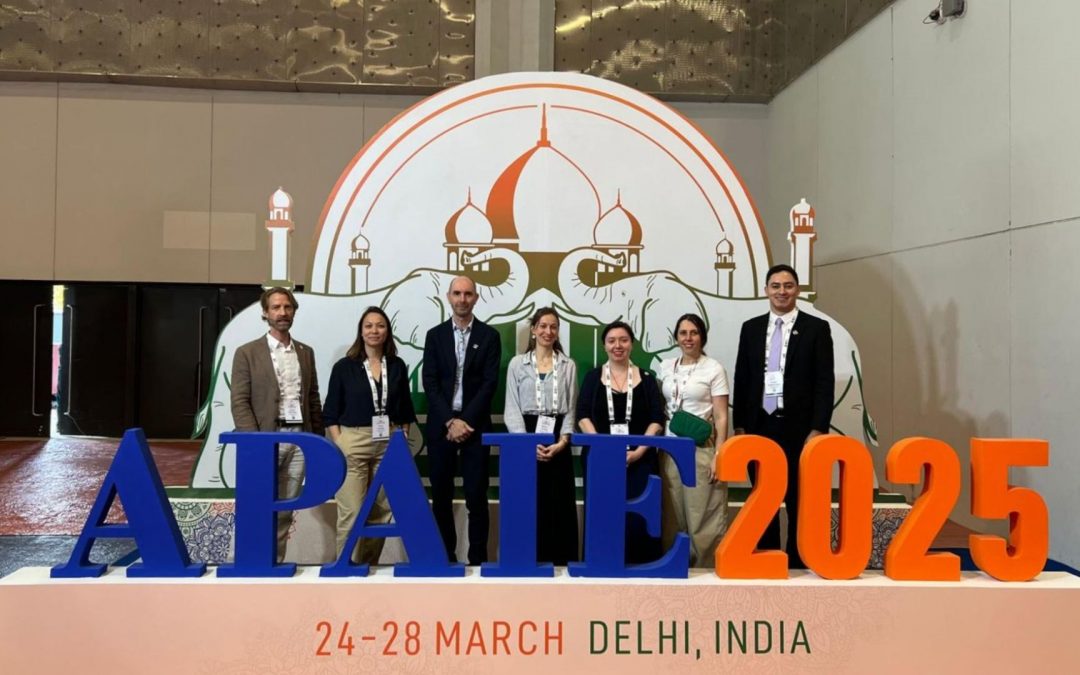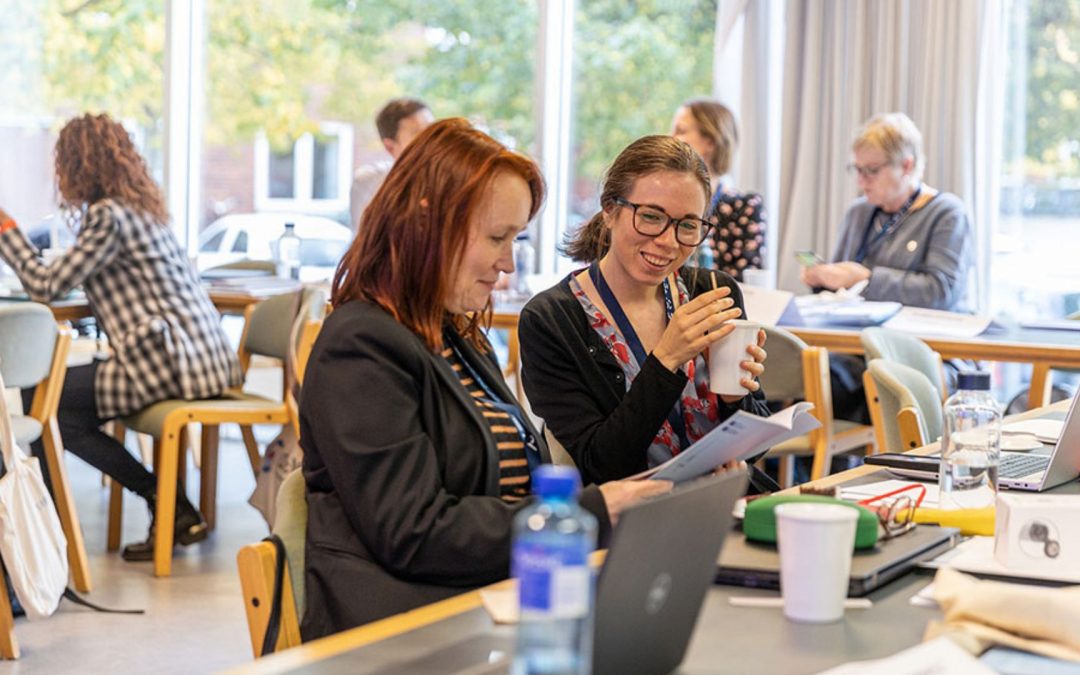Partnerships
Universite Paris Cité is pursuing its development through an intensified partnership approach nationally and internationally with research organisations, universities and schools, local authorities, networks and socio-economic players to promote research and academic collaborations in areas of common interest.
International
National University of Singapore (NUS)
Université Paris Cité and National University of Singapore (NUS) sign a Memorandum of Understanding to continue their international cooperation within the framework of the USPC, and to promote research and academic collaborations in areas of common interest.
Paris Oxford Partnership (POP)
The “POP” (Paris Oxford Partnership), is a strategic partnership between Université Paris Cité, the National Centre for Scientific Research (CNRS) and the University of Oxford. The three parties concluded a Memorandum of Understanding with the aim of promoting cooperation in the field of interdisciplinary research in the Humanities and Social Sciences, in collaboration with other disciplines where appropriate for their mutual benefit.
King's College London
King’s College London and Université Paris Cité signed an agreement of strategic partnership in the presence of French Embassy officials at Somerset House.
Circle U. European University Alliance
The European University Circle U. brings together the universities of Oslo, Paris, Aarhus, Pisa, Vienna, Humboldt in Berlin, Belgrade, King’s College London and Université catholique de Louvain. Université Paris Cité is one of the 9 Circle U. universities. Together with its partners, the alliance aims to shape the future of the European university landscape. Circle U. offers inter-university opportunities to students, staff and researchers. It is a laboratory of ideas for advancing teaching and research, and contributing to the transformation of society.
The Guild
Founded in 2016, The Guild network brings together more than twenty of the most prestigious european research-intensive universities from sixteen countries. The members have established a distinct voice aiming to further research, create innovation for public benefit, and enrich public debate at European and national levels. The network is committed to sharing knowledge, experience and best practices to cultivate excellence in research and in higher education.
National
Assistance Publique Hôpitaux de Paris – APHP
The AP-HP is a major partner of Université Paris Cité since half of the hospitals in Paris will be affiliated to it. The AP-HP is a university hospital center, a major player in clinical research in France and Europe, recognized worldwide. Its 39 hospitals receive 10 million patients each year: in consultations, in emergencies, during scheduled hospitalizations or in hospitalization at home. It provides a public health service for all, 24 hours a day, and is both a duty and a source of pride for the company. The AP-HP is the leading employer in the Paris Region: 95,000 people – doctors, researchers, paramedics, administrative staff and workers – work there.
CEA
The Commissariat à l’énergie atomique et aux énergies alternatives (CEA) is a public scientific, technical and industrial research organisation (EPIC). A major player in research, development and innovation, the CEA is active in four areas: defence and security, low-carbon energies (nuclear and renewable), technological research for industry and fundamental research (material sciences and life sciences). Building on its recognised expertise, the CEA participates in setting up collaborative projects with numerous academic and industrial partners.
CNRS
The National centre for scientific research is one of the world’s leading research institutions. To meet the major challenges of today and tomorrow, its scientists explore life, matter, the Universe and the functioning of human societies. Internationally recognized for the excellence of its scientific work, the CNRS is a reference both in the world of research and development and for the general public.
The CNRS and Université Paris Cité
The CNRS has many subjects and projects of common interest with Université Paris Cité. They collaborate to harmonize their policies on research topics at the interface of emerging, scientifically innovative themes. They are developing new interdisciplinary programs focused on scientific research objects and major societal issues.
The CNRS and Université Paris Cité are committed to improving the training of doctoral students and their professional development. They are setting up a concerted policy of research valorisation and transfer with the SATT IdF Innov.
As for the scientific platform policy, it is the subject of consultation in terms of equipment, infrastructure and human resources.
In terms of HR policy, Université Paris Cité hosts a delegation of teacher-researchers, compared with 13,100 hours of courses given by CNRS researchers in the 1st, 2nd and 3rd cycles.
Key figures :
Scientific weight :
- 79 UMR
- 8 UMS + 2 USR
- 10 FR
- 4 ERC
International : 5 UMI et 28 LIA
Personnels CNRS : 1588 dont 921 chercheurs et 676 ITA
Investissement financier pour le CNRS : 122 M€ salaire + 8,6 M€ investissement
Erganeo
Erganeo, Société d’Accélération de Transfert Technologique, works for academic players (universities, research centres) in the Ile-de-France region. This scope allows it to cover a vast field of knowledge. This French investment fund specializes in breakthrough innovations (Deep Tech) with a strong societal impact. They invest as early as possible, upstream of the creation of the start-up, in three areas: Biotech, Infotech (Telecom, connected objects, big data, AI) and Enertech (new energies, chemistry, materials). Their mission is to accelerate and simplify the associations between Research and Industry in favour of societal progress. To do this, Erganeo finances and supports the new generation of French researcher-entrepreneurs on their way to success and international recognition.
INED
Founded in 1945, the Institut national d’études démographiques (INED) became a public scientific and technological establishment (EPST) in 1986 under the dual supervision of the Ministry of research and the ministry of social affairs. The Institute’s mission is to study the populations of France and foreign countries, to widely spread the knowledge produced and to assist in training in and through research. Through an open approach to demography, it mobilises a wide range of disciplines such as economics, history, geography, sociology, anthropology, biology and epidemiology. With its 11 research units, it encourages exchanges and conducts numerous European and international research projects.
Inria
Inria, the national research institute dedicated to digital sciences, promotes scientific excellence and transfers in order to have the greatest impact.
It employs 2,400 people. Its 200 agile project-teams, generally joint with academic partners, involve more than 3,000 scientists to meet the challenges of computer science and mathematics, often at the interface of other disciplines.
Inria works with numerous companies and has supported the creation of more than 160 start-ups. The institute thus strives to meet the challenges of the digital transformation of science, society and the economy.
Inserm
Created in 1964, Inserm is a public establishment of a scientific and technological nature, placed under the dual supervision of the ministry of Health and the ministry of Research. Dedicated to biological, medical and human health research, it covers the entire range from the research laboratory to the patient’s bedside. On the international scene, it is the partner of the largest institutions involved in the scientific challenges and progress in these fields.
Inserm and Université Paris Cité
Université Paris Cité and its USPC partners constitute the leading European centre for biomedical research in terms of resources invested (15% of the Inserm budget: endowments, payroll, equipment, exceptional credits, etc.).
The 46 UMRs bring together several major centres of excellence and are involved in fields as varied as gene therapy, oncology, cardiovascular, hepatology, immunology, infectiology, public health, neurosciences, bioinformatics, etc.
This richness makes Université Paris Cité a leading research university in health biology with multidisciplinary expertise.
The recent EUR labels (“EURIP” for interdisciplinary research and “G.E.N.E.” on genetics) on the perimeter demonstrate the close link between research and training. The 5 RHU (24 in France) and 2 IHU (Imagine and Saint-Louis) are open to the industrial world.
Key figures
- 46 UMR
- 7 CIC
- 3 US
- 4 LabEx
- 2 IHU
- 4 RHU
- 4 EUR déposées dont 2 sélectionnées
- 2 infrastructures en Biologie et Santé
International : 4 LIA et 1 LEA
Investissement financier pour l’Inserm : 135 M€
IRD
The Institut de recherche pour le développement (IRD) is a french public scientific and technological institution (EPST). This body participates in scientific and technical research through agreements signed between France and certain developing countries.
These research programmes, designed to provide development aid to developing countries, focus on human and social sciences (geography, sociology, etc.), health sciences (infectious diseases, major endemic diseases, nutrition, environment) and natural sciences (hydrology, pedology, geophysics, ichthyology, etc.).
Alliance Sorbonne Paris Cité (ASPC)
ASPC aims to bring research and education to the forefront and to make international outreach a fundamental dimension of academic life. Its ambition is to create new inter-institutional, interdisciplinary, international and innovative research dynamics. It also seeks to nurture an attractive campus life and play a role in the development of ideas.
Members of ASPC :
- Université Sorbonne Paris Nord
- Université Paris Cité
- Inalco
- Sciences Po
- Institut national d’études démographiques (Ined)
Read more

Université Paris Cité explores new cooperation opportunities in India
To mark the 25th anniversary of bilateral cooperation between France and India, a delegation from Université Paris Cité, led by Antoine Kouchner, Vice President for International Relations, went to India from March 24 to 28, 2025. This visit provided an opportunity to...

Circle U. Communities of Practice: Exchange and Innovate!
The European university alliance Circle U. is calling for the creation of Communities of Practice (CoPs). The aim is to bring together administrative, teaching, and research staff with shared interests to exchange best practices. Have a topic you'd like to explore...

Support Female Entrepreneurship with Circle U.
Are you an aspiring entrepreneur? Do you want to prove that entrepreneurship is not just for men? Together, let's redefine the rules of entrepreneurship! Circle U. invites you to their events, organised from April 26 to 29, to take action for a fairer entrepreneurial...

Université Paris Cité at APAIE 2025 in India
Université Paris Cité will be attending the 2025 edition of APAIE (Asia-Pacific Association for International Education), a leading event in global higher education. This year's event takes place in New Delhi, India, and brings together academic institutions and...
